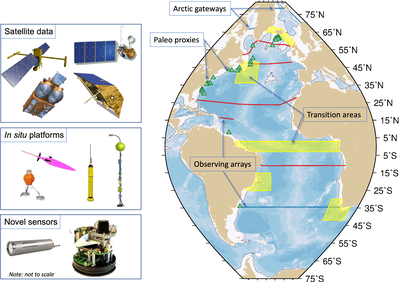EPOC project (2022 - 2027)
EPOC will generate a new concept of the Atlantic meridional overturning circulation (AMOC), its function in the Earth system and how it impacts weather and climate. We do this using numerical simulations of the climate system, observations of the AMOC spanning the Atlantic from 35°S to the Arctic, and new technological advances to design a future observing system.

The AMOC is a key component of the climate system, responsible for ocean heat and freshwater transport, associated with the ventilation of anthropogenic carbon, and anticipated to experience or drive climate tipping points. However, the link between ocean transport, ventilation and tipping points relies on the common conceptual view of the AMOC as a ‘great ocean conveyor’ which was developed to explain very long timescale (glacial-interglacial) fluctuations in climate. The conveyor belt schematic conflates millennial timescales with human timescales (days to 100 years), leading to misconceptions by the observing and modelling communities, and misplaced expectations about the AMOC’s role in climate.
EPOC will capitalise on new understanding about the AMOC variability and coherence from two decades of AMOC observations and advances in ocean observing technology and climate modelling in order to develop new tools and approaches to quantify and explain past AMOC change and how its connectivity (or lack thereof) imprint on the Earth system. Through joined-up observational and model experiments, focussing on next generation high resolution coupled models, machine learning techniques and critical re-assessment of paleo proxies, EPOC will generate a new conceptual framework for the AMOC, its meridional connectivity, feedbacks and the relationship between ventilation and overturning on human timescales. This will lead to better predictions of the AMOC and related climate evolution, including the risk of rapid change.
EPOC will capitalise on new understanding about the AMOC variability and coherence from two decades of AMOC observations and advances in ocean observing technology and climate modelling in order to develop new tools and approaches to quantify and explain past AMOC change and how its connectivity (or lack thereof) imprint on the Earth system. Through joined-up observational and model experiments, focussing on next generation high resolution coupled models, machine learning techniques and critical re-assessment of paleo proxies, EPOC will generate a new conceptual framework for the AMOC, its meridional connectivity, feedbacks and the relationship between ventilation and overturning on human timescales. This will lead to better predictions of the AMOC and related climate evolution, including the risk of rapid change.
Project website
Funding
EPOC is funded under the European Union’s Horizon Europe program, under the call HORIZON-CL6-2021-CLIMATE01 (2022-2027). UK associate partners are independently funded by UKRI. EPOC is led by the Universität Hamburg with partners in France, Germany, Norway, the UK, USA and Canada.
Funding statement: EPOC is funded by the European Union. Views and opinions expressed are however those of the author(s) only and do not necessarily reflect those of the European Union. Neither the European Union nor the granting authority can be held responsible for them.
Grant numbers:
Related publications
EPOC: Project News.
EPOC Project,
2023.
Should AMOC observations continue: how and why?.
Phil Trans A,
2023.